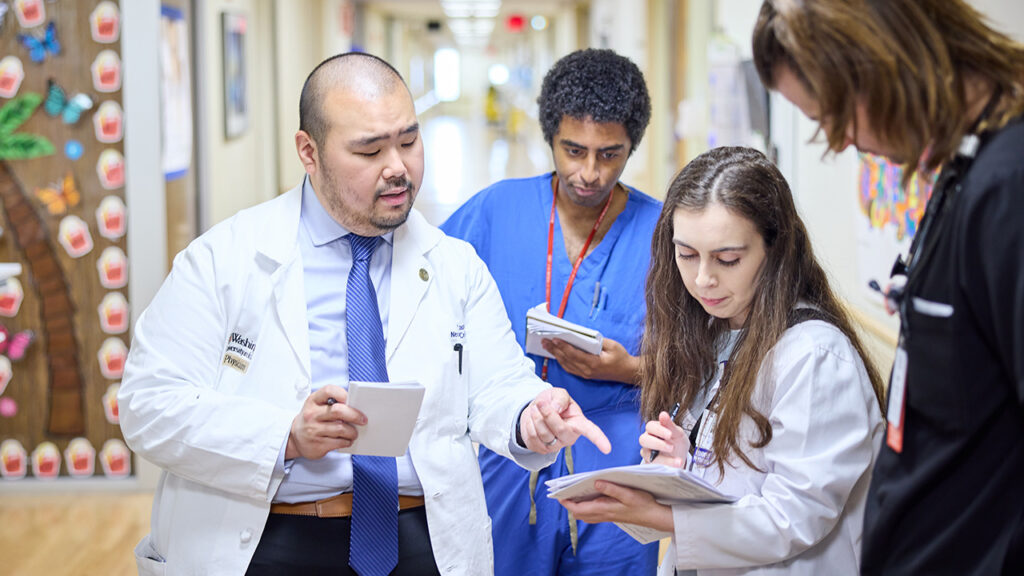Jump to…
“In my time at WashU, I saw every possible rare, unusual case imaginable. It felt like every week someone would say, ‘Hey we should write that up’ after another unique case came in.”
Elizabeth Perelstein, MD, house staff ’20
Assistant Professor, Brown University
Exceptional training

As a resident at Washington University, you’ll join a collaborative community of neuroscience physicians and scientists.
- Our seamlessly integrated categorical program allows you to obtain a mastery of internal medicine during your intern year interspersed with rotations on inpatient psychiatry and the Emergency Department as well as on the neurology wards, learning how to read EEG in our basics of EMU introductory rotation and exploring outpatient neurology subspecialties, all before you even start your PGY-2 year.
- In the clinic, you’ll treat everything — and a lot of it. We draw a large patient population with conditions from the common to the rare and complex. Learn about our clinical environment
- Gain clinical expertise with confidence. With our supervised, graded independence, you’ll have decision-making responsibility with the right amount of support and guidance.
- Learn from world-renowned faculty in every neurology subspecialty and all related specialities.
- Join an immense neuroscience community, with 170+ faculty in neurology alone.
- 35 weeks of elective time allows you to pursue your interests in the clinic, hospital, research laboratory and even internationally!
- Choose from fellowships in every subspecialty, if you plan on further training after residency.
Program tracks
Master clinician track
Our Master Clinician Track provides intensive exposure to wide variety of neurological specialties taught by faculty designated as master clinicians. This track provides the training and tools needed to be a highly competent modern day neurologist with special emphasis on diagnostic reasoning, management of complicated and multifaceted neurologic conditions, the bidirectional relationship between neurologic and systemic disease, procedural expertise, health care economics, and social determinants of health. Graduates in this pathway will be well-equipped to begin independent practice whether it is right out of residency as a general community neurologist, after fellowship as a subspecialist in academic medicine, or anything in between. Training is individualized to each resident.
Training focus
Diagnostic skills • Use of cutting-edge technology • In-depth understanding of neuropathology and evidence-based medicine
Physician-Scientist track
Our Physician-Scientist Track allows you substantial time during your residency training, including dedicated time as early as your intern year to pursue bench, translational or clinical research under the mentorship of world leaders in neurology. Combined with this expertise and WashU being the #1 NIH funded neurology department, your opportunities are limitless. We have a strong record of securing R25 funding and many of our graduates have primarily research careers, with early success in obtaining federal and private grants and progressing to independent scientists with their own lab. Our graduates are leaders in the spectrum of research from studying basic mechanisms underlying disease in cell lines and animal models all the way to health disparities and dissemination and implementation research.
Training focus
R25 proposal mentorship • field-changing research opportunities • opportunity to obtain Masters of Science in Clinical Investigation
Clinician Educator track
Our Resident Education Track provides an individualized and comprehensive training plan to prepare the residents for a career in education. Resident educators interested in a future career in undergraduate or graduate medical education will work closely with education leadership in the Department of Neurology and education experts throughout the medical school to hone their education skills. Through a tailored training plan implemented throughout residency, residents will gain experience in curriculum design and management, mentorship, coaching and feedback delivery. Residents will also grow their skills in bedside teaching and didactics. Graduates in this pathway will be competitive and highly skilled educators in academic medicine.
Training focus
Didactic skills • Assessment • Feedback delivery • Mentorship and coaching • Curriculum design and management • Identification and use of education theory • Consumption and production of education scholarship
Supportive approach
- Mentoring is a priority. Our 170+ faculty are passionate about teaching and committed to your success.
- Diversity, equity and inclusion are at our very core. Every mission of our department is guided by these values.
- We have a culture of family, in which fellow residents become your lifelong friends, and faculty are here to support you.
Are you ready?
Learn more about our application process.